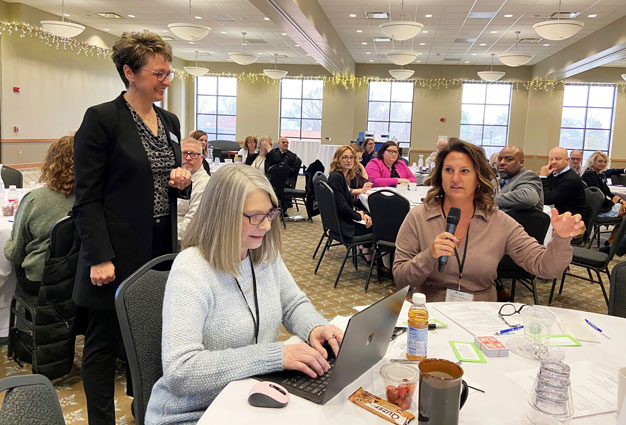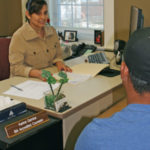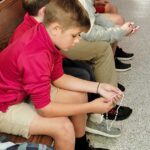
St. Ambrose University President Amy Novak listens as a participant in the St. Ambrose Innovation Summit: Building the Next Generation Workforce makes a point during the event held April 7 in the university’s Rogalski Center in Davenport.
By Barb Arland-Fye
The Catholic Messenger
DAVENPORT — Between brainstorming sessions, 120 business leaders in a summit on innovation at St. Ambrose University listened to senior Emma Duncan and freshman Deon Harrison describe how the university is preparing them to meet the emerging needs of the labor force.
The aim of the April 7 summit was to “help St. Ambrose University better serve current and prospective students in preparing them for the future of human work,” Amy Novak, the university’s president, told the gathering. “We will become an agile and innovative St. Ambrose University only in close partnership with the business community.”
Duncan credited the university, particularly its College of Business, for helping her to “know that I have a community that I can depend on and an environment that encourages me to learn and explore my interests.” She shared with the business leaders her passion for the environment and sustainability, which “exploded when I took an environmental science class in the spring of my sophomore year.” This fall, she will be a member of the first cohort in the University of Iowa’s Master in Sustainable Development, she said.
Harrison, majoring in finance and sales with a minor in marketing, told the business leaders “the welcoming staff and faculty here have given me the room to grow as far as I feel comfortable, without limitations.” He participates in numerous clubs on campus, “which have helped me increase my skills, network and to grow as a leader,” he said. “St. Ambrose has also connected me with people like you, which has resulted in me getting an internship at Quad City Bank & Trust.”
RELATED: SAU receives largest single gift in its history
Novak stressed the importance of such learning and earning experiences to ensure that new employees are proficient from day one. She underscored the realities of the swiftly changing world of work, providing an overview of the trends shaping business and higher education and reviewing the nature of problem solving to make innovative solutions possible. She cited statistics from the World Economic Forum (2020) that 69% of children entering primary school will work in jobs that don’t exist today and that 54% of today’s workforce will require “upskilling” or “reskilling” to address the labor force’s needs.
She also cited a survey by Gallup that asked respondents to evaluate the critical-thinking abilities recent college graduates brought to their first jobs; 96% of college and university provosts were confident their graduates were equipped for the challenge. However, only 11% of CEOs agreed.
Representatives of Quad-Cities-based companies such as Deere & Company, Arconic, the Rock Island Arsenal, Modern Woodmen, Lee Enterprises and Quad City Bank & Trust participated in the summit, as did companies based elsewhere in the region. Local health systems Genesis and Unity Point-Trinity and local labor associations also participated.
At their individual tables, business leaders engaged in “thought exercises” that included exploring trends shaping different industry sectors and how the university can align those trends with future educational offerings. Common themes emerged. Future employees, for example, seek employment that gives them a sense of passion and purpose and that provides flexibility and recognizes the value of a life outside of work.
“Many people my age highly value a healthy work-life balance and want to be in a career that is meaningful to them, not just a job that pays the bills,” Duncan told The Catholic Messenger in a follow-up email interview. “We want employers to see us as fully developed and complex people instead of a means to achieve their bottom line. This could be done through flexible schedules, remote work options, paid mental health days and improved health benefits. We also want to have purpose in our careers and feel as though we are making a positive difference and helping people.”
Novak said supporting individuals’ talents and goals is essential, along with creating a sense of belonging in the workplace. Her husband Ken Novak, a facilitator in his small group of business leaders, said businesses need to understand the motivation of their prospective employees.
The pace of change will not slow down, so companies need to be agile and adapt, he said.
Smart machines and artificial intelligence are components of the new age of work, which will drive efficiency and production, Amy Novak said. “This means the value of the human workforce will lie even more distinctly in the so-called ‘human skills’ — those capacities to clearly communicate, work in teams, assess and analyze complex data, and, yes, to think critically and solve problems.”
She addressed a concern raised about interaction between the younger and older generation of workers by encouraging mentoring relationships that value both the young workers and what she described as the “wisdom generation” of workers.
Mike Oberhaus, a St. Ambrose alumnus and interim CEO and chief strategy officer for the Quad- Cities Chamber, commended his alma mater for “deepening the partnership between business and education and listening to the voice of business.”
Preparing young adults for success in their careers requires the university and its students to understand the needs and wants of the community in which they will work, Oberhaus said. St Ambrose’s proactive approach will help businesses keep pace with swift advances in technology. Employees from every generation will benefit from enhanced workforce education, he said.
St. Ambrose alumna Laura “Divot” Ekizian, the president of Quad City Bank & Trust and the summit’s co-director, emphasized the value of building “a higher level of confidence between our business community and St. Ambrose.” That focus will enable the university “to equip students to come into our businesses and really have an impact from day one,” she said. “The business community can tell St. Ambrose what we need and St. Ambrose can be nimble enough to respond.”
Renee Citera, a St. Ambrose alumna and member of the university’s Board of Trustees, spoke of a timeless attribute of the university that has allowed her to flourish in the business world. “The way I learned was very experiential. We practiced, we tried things.” The instructor to student ratio made experiential learning possible, she said.











